Peace and Nonviolence
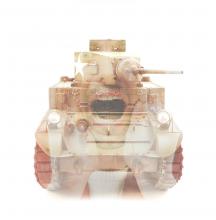
During my recent visit to Gangjeong, on Jeju Island, South Korea, where a protest community has struggled for years to block construction of a U.S. military base, conversations over delicious meals in the community kitchen were a delightful daily event. At lunchtime on my first day there I met Emily and Dongwon, a young and recently married couple, both protesters, who had met each other in Gangjeong. Emily recalled that when her parents finally travelled from Taiwan to meet her partner, they had to visit him in prison.
Dongwon, who is from a rural area of South Korea, had visited Gangjeong and gotten to know the small protest community living on the Gureombi Rock. Drawn by their tenacity and commitment, he had decided to join them. When a barge crane was dredging the sea in front of Gureombi Rock, Dongwon had climbed up to its tip and declined to come down. On February 18, 2013, a judge sentenced him to one year in prison for the nonviolent action.
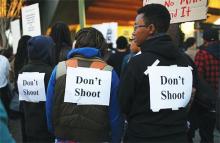
AFRICAN AMERICANS around the country are finding it is dangerous to call 911. Jack Lamar Roberson’s family in Waycross, Ga., discovered this the hard way when they placed an urgent call to 911 in October 2013 because his fiancée thought that he had taken an overdose of diabetes medicine.
Instead of sending EMTs, the dispatcher sent the police. Within 20 seconds of being in the house, police shot Roberson nine times, with bullets striking his back, arms, chest, and head as he held his arms up in the air. Although he was a veteran, he did not die from bullet wounds at the hands of strangers in a foreign land. Instead, white police gunned him down in his home.
Killings like this—which could be called anti-black hate crimes by police—are far too common. “Operation Ghetto Storm,” a 2012 report by the Malcolm X Grassroots Project, revealed that white police officers, security guards, or vigilantes kill an unarmed black man, woman, or child every 28 hours in the U.S. In 2012, police officers shot 57 people in Chicago—50 were black, two were white. Miami police officers killed seven black men within eight months in 2011. The Houston-based African-American News & Issues headlined an article this spring: “Open Season on Blacks in Texas: Cops Are Shooting First & Not Asking Questions.”
These police killings of black people emerge out of a culture and system of white supremacy. In such a context, police killing of black people is not a black problem. It is an American problem that shreds the curtains of democracy.

THE VIOLENCE AND kidnappings in Nigeria are more than a religious conflict: They are a political manipulation of religion.
Before the 2011 Nigerian election, northern politicians (who are mostly Muslims) threatened to make the country ungovernable if Goodluck Jonathan, a Christian from the south, became president. Jonathan was vice-president for Umaru Musa Yar’Adua, a Muslim from the north, who died before completing his eight-year term. Jonathan assumed power after Yar’Adua’s death, as is allowed by the constitution. However, northern Muslims claimed that since Yar’Adua did not finish his term, they should be allowed to place someone of their own choosing in power. Jonathan’s refusal angered the north.
In response, the Muslim terrorist organization Boko Haram began intensifying its attack on Jonathan’s rule in order to discredit his presidency and his pursuit of the 2015 election. If Boko Haram succeeds in pushing Jonathan out, southern militia groups are likely to commence their own violent campaign. These terrorists are trying to manipulate people by making them think that it is a religious fight, when in reality it is about political power.
People, however, are beginning to reject the violence. In April, as the world is well aware, Boko Haram kidnapped more than 200 schoolgirls from Chibok, a community that is said to be about 90 percent Christian. The outcry of rage and pain about this incident transcended religious lines. In a May market bombing in the city of Jos, both Christians and Muslims lost their lives. After the bombings, Muslims and Christians on the streets of Jos tried to work together in finding a way through the situation. People no longer want to fight and are starting to value peacebuilding and interfaith efforts. This is a sign of hope.

ONE DAY, WHEN I was a student at Christ the King Elementary School in my hometown of Richland, Wash., the nuns gathered all the kids, two by two, and walked us outside to the parking lot. There sat a mobile van emblazoned with the logo of the Atomic Energy Commission and the words “Whole Body Scanner.”
One at a time, we were led into the van, where we laid on a white-sheathed table beneath a large, (scary), medical-looking machine. There was a whirring sound, and after a minute or two we were told to get up and make room for the next child. We weren’t told what the process was for, but it’s safe to assume that the government was interested in the effects of radiation on those of us who were “downwinders” from one of the nation’s largest nuclear complexes.
Richland was (and is) the bedroom community for the Hanford Nuclear Reservation. Hanford was built in the 1940s as part of the Manhattan Project, the massive wartime program that led to the atomic bombs dropped on Hiroshima and Nagasaki at the end of World War II. Hanford’s role was the production of plutonium for the world’s first nuclear weapon, the “test” bomb detonated in New Mexico a few weeks before Hiroshima, and for the bomb that destroyed Nagasaki three days later.
Those weapons were dropped 69 years ago, but the debate about their morality continues. It emerged again this spring when the two Missouri senators proposed renaming D.C.’s Union Station after Harry S. Truman, who authorized history’s only nuclear attack on people. One commenter in a related discussion wrote, “I have a problem with judging past cultures by today's standards. To end WWII we dropped bombs on cities filled with innocent civilians. By today's standards that would be condemned. Are you willing to say we should not have done that to end WWII?”
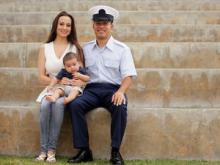
There are two prevalent ways that we contribute to or allow the sacrifices of our daughters and sons in contemporary U.S. society. One, the numbers of individuals, especially children and youth, who are killed through gun violence each year. Two, veterans and their families who are not receiving the adequate and timely care and support they deserve. Both these forms of sacrifice have become so normalized as part of U.S. culture that it has become easy to overlook them or to call something else.
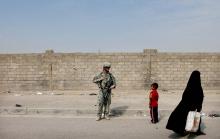
America is stunned by what is happening in Iraq right now, and happening so quickly. We may be facing the worst terrorist threat to international security so far — despite all we have done and sacrificed. Both our political leaders and media pundits are admitting there are no good options for the U.S. now. But there is an option we could try for the first time: humility. Let me turn to two biblical texts that might provide some wisdom for both the religious and non-religious.
If your enemies are hungry, feed them; if they are thirsty, give them something to drink; for by doing this you will heap burning coals on their heads. Do not be overcome by evil, but overcome evil with good. (Rom. 12:20–21)
Blessed are the peacemakers, for they will be called the children of God. (Matthew 5:9)
All nations use propaganda to tell half-truths and spread misinformation about their enemies, which should be honestly challenged. Even so, it is also true that we have real enemies in this world, as individuals, groups, and nations. To assume otherwise is foolish, from the perspective of history, certainly, but also in light of good theology about evil as part of the nature of the human condition. According to the Bible, even our faith communities will encounter enemies. Jesus’s teaching assumes that we will have enemies, and he teaches us how to treat them. In the passages above, Jesus and Paul the Apostle offer guidance for more effective ways of dealing with our enemies. It seems to be clear that our habit of going to war against them is increasingly ineffective. For the past several years, we have found ourselves in a constant state of war with “enemies” who are very hard to find or completely defeat.

I grew up in the state of Colorado. It’s known for cowboys, mountains, skiing, smoking pot, the Broncos, but also — mass school shootings. Since the recent shooting at Seattle Pacific University my connection to mass murder and school shootings has become all too familiar.
My younger brother is a freshman at Seattle Pacific University where a 26-year-old with a shotgun recently killed one and injured three others in the latest school shooting. My brother is finishing up his first year of school as a music major before moving to Santa Cruz in the summer to work as Christian summer camp counselor. While untouched by the damage to the shooter, another young man on the same dorm floor as him, Paul Lee, was not so fortunate. He was taken to the hospital where he was pronounced dead (three other wounded victims survived). Though the body count was considerably less than recent events at Santa Barbara, its timing mirrors the increasing normality with which such shootings are now taking place. Sadly, a tragedy such as this merely becomes fodder for political bickering and ideological advancement.
My brother and I grew up with guns in the town of Bailey, Colo. Bailey is a strange mixture of rednecks, conservative Christians, new age folks, commuters, hippies, outdoor enthusiasts, and undeniably proud gun owners. My dad was a hunter and kept a rifle beneath his bed, which was made out of Aspen trees he chopped, stripped, and stained himself. Every October he would take a week off work and go into the mountains with some friends to go hunt.

On June 10, Emilio Hoffman, a 14-year-old student at Reynolds High School in Troutdale, Ore., was transformed, from a good-hearted kid with his life ahead of him to a statistic.
He was an athlete, a soccer coach, a people pleaser, a brother, a son. He had a girlfriend, and he loved to make people laugh.
Now, he’s a red dot on a graph, one blip in an “American victims of gun violence” total that is already absurdly high, and will no doubt be higher the next time you check it.
Emilio’s crime? He went to school, on a day that another student decided — for reasons none of us can fathom — to bring an AR-15 rifle from home and start shooting people.
What happened to Emilio is not a tragedy. A tragedy is when something happens that no one could have helped: an accident, a natural disaster, a crime that could not have been foreseen or prevented.

We have weapons, and, in our brokenness, we tend to use whatever weapons we think will work.
Some of our weapons get assigned gender tags. Men, we say, tend to shout, bully, interrupt, trivialize, ignore “no,” and turn to violence. Women, we say, tend to manipulate, conspire, and blame.
But those tags mean little, and they don’t begin to describe the balance of abuse, which, as women know and men are learning, is overwhelmingly abuse of women by men.
Some weapons aren’t about gender. Some people use social status as a weapon. Age stifles youth, and youth embarrasses age. Long-timers freeze out newcomers, and the new form their own exclusive tribes. Wealth bullies poverty. The dominant race represses minorities. Heterosexuals bully homosexuals. Those with hiring power hire their own kind. More and more carry firearms and seem eager to use them.

Good and Gracious God,
Yet again,
our nation grieves.
Yet again,
the life of a child
has been cut
dreadfully short.
Yet again,
we all rally to our
political centers
to cry out
for our guns,
for our rights,
for our safety,
for rational thought...
Jon Meis, the first person to respond to the campus shooting at Seattle Pacific University, released a statement thanking other early responders this morning. During the June 5 shooting, Meis tackled the suspect and used pepper spray to subdue him. In his statement published by KIRO news, Meis requested that all further donations be given to the victims through Seattle Pacific. He laments the necessity of a tragedy to make a hero and encouraged all to meet hate with love:
However, what I find most difficult about this situation is the devastating reality that a hero cannot come without tragedy. In the midst of this attention, we cannot ignore that a life was taken from us, ruthlessly and without justification or cause. Others were badly injured, and many more will carry this event with them the rest of their lives. Nonetheless, I would encourage that hate be met with love. When I came face to face with the attacker, God gave me the eyes to see that he was not a faceless monster, but a very sad and troubled young man. While I cannot at this time find it within me to forgive his crime, I truly desire that he will find the grace of God and the forgiveness of our community.

Pope Francis dived into the Middle East peace process on Sunday, urging the Israeli and Palestinian presidents to act with courage and end what he called the “spiral of hatred and violence” during a historic prayer meeting at the Vatican.
The Middle East leaders were joined by the Ecumenical Patriarch Bartholomew, spiritual leader of the world’s Eastern Orthodox Christians, and proceeded to the Vatican gardens for a tightly orchestrated 90-minute ceremony that was notable for the absence of any religious symbols.
Earlier, in St. Peter’s Square, a handful of protesters waved Palestinian flags in a bid to send a stronger political message to what the Vatican previously described as a “pause from politics.”
In his opinon column published on June 6, George Will suggests that colleges have "become the victims of progressivism," blaming a proliferation of victims on government overreach. In his first paragraph, Will disregards the validity of sexual assult on campuses, as he says:
[Colleges and universities] are learning that when they say campus victimizations are ubiquitous (“micro-aggressions,” often not discernible to the untutored eye, are everywhere), and that when they make victimhood a coveted status that confers privileges, victims proliferate. And academia’s progressivism has rendered it intellectually defenseless now that progressivism’s achievement, the regulatory state, has decided it is academia’s turn to be broken to government’s saddle.
In response to his article, survivors have taken to Twiter with #SurvivorPrivilege.
#SurvivorPrivilege pic.twitter.com/zNFggXGT64
— Elizabeth Plank (@feministabulous) June 9, 2014
One in four individuals will suffer with a mental health issue in a given year — and that these statistics can often be our friends, family, or ourselves. After tragedies like what happened in Isla Vista and on Seattle Pacific’s campus, we listen to the voices of victims’ families and mourn with them as they share stories of their lost loved ones. But we ignore an even more painful story about the lives of the gunmen.
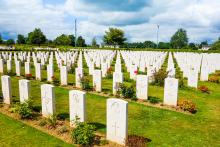
On this 70th anniversary of D-Day, I thought of my father, who died several years ago. James Emerson Wallis, Sr. was commissioned in the Navy, graduated from college at the University of Michigan, and was married — all on the same June day in 1945! After a very quick honeymoon, my Dad was sent out almost immediately to the Pacific as the engineering officer on a destroyer minesweeper. I heard most about that day, and the days that followed, while sitting with my father on the benches at the World War II Memorial shortly after it opened in Washington, D.C. I soon realized why there were so many benches there — so old war veterans could sit down for a while, even for hours, to remember and tell their stories to the ones they most love.
For his 80th birthday, our family invited my dad to go anywhere in the world he wanted to go. He said he wanted to go to Oxford, England, to see the where his favorite Christian author C.S. Lewis lived — and then he wanted to go to Normandy, where so many of his high school buddies died on D-Day. He wanted to go to those beaches and to that special place himself to see the memorials to his friends. So we did both. My father got to sit at the desk of C.S. Lewis with a big smile on his face. Then I took my dad and my father-in-law to that very solemn place where American and Allied soldiers paid such a heavy human cost in perhaps the most historically significant military action in history.
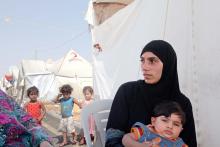
I wish I could sit beside you on a cushion on the floor and have a cup of tea with you. I would like to snuggle your baby in my arms. I would like to hear your story. I know you have a sad story, and if I heard it, I would weep.
I know you are good and loving women. I’m sorry you have lost so much. I’m sorry you had to come to a country, a city, and a house that is not yours.
I can imagine you in your own country, strong women serving others. I can imagine you making beautiful food and sharing it with your family and friends. I can imagine you caring for your mothers and daughters, fathers and sons, sisters and brothers and friends. Just the way I do.
Because that’s what women do. We are compassionate. We give. We serve. We protect. We work hard to make the world better for the people we love.
Wherever I go in the world, I discover that we women are very much alike. We may have different clothes. Different languages. Different cultures. Maybe our skin is a different color. But in our hearts, we are the same.
That’s why we can look into each other’s eyes and feel connected. We can talk without using words. We can smile. We can hug. We can laugh.
And sometimes, we can feel each other’s pain. I have prayed that God would help me feel your pain. I wish I could remove your pain. I wish I could help you carry it.

The newly freed soldier who spent nearly five years in captivity in Afghanistan has the mental and physical toughness to survive the experience, his former pastor said.
“If there’s anybody I can think of pulling through this, and doing well, it’s Bowe,” said Philip Proctor, who was pastor of Sovereign Redeemer Presbyterian Church in Boise, Idaho, when Bergdahl was a teenager.
“He has the mental and physical stamina not to be crushed by this experience,” Proctor said.

Recently I had the privilege of attending the Mass led by Pope Francis in Bethlehem’s Manger Square. I am not a Catholic – but like many who are not, I have been inspired and touched by Pope Francis. I do not know what is it exactly that draws me to him! Is it his humility? His compassion for the poor? His social justice concern? His true ecumenical spirit ? Maybe all of the above!
Back to Manger Square. It was truly a special day. There were Palestinian Christians from all over Palestine and Israel. There was a sense of euphoria in the air. I have never seen Bethlehem like this before. I have never in my life witnessed Palestinian Christians with so much joy and jubilation. People were excited. Nuns were dancing in the streets. There were hymns, flags, smiles. For few hours we forgot we were occupied.
However, the most iconic moment during the Pope’s visit to Bethlehem did not take place in the Manger Square, nor the Nativity Church. It took place next to the Separation Wall.
Yuri Kochiyama, a Japanese-American human rights activist, died on Sunday at the age of 93. Kochiyama's family was among those Japanese-Americans interned by the United States during World War II.
NPR reports on her work:
Living in housing projects among black and Puerto Rican neighbors inspired her interest in the civil rights movement. Kochiyama held weekly open houses for activists in the family's apartment, where she taped newspaper clippings to the walls and kept piles of leaflets on the kitchen table. "Our house felt like it was the movement 24/7," said her eldest daughter Audee Kochiyama-Holman.
Kochiyama is also known for rushing towards Malcom X after his assination, where she appeared images of the incident, according to NPR:
Minutes after gunmen fired at Malcolm X in 1965 during his last speech in New York City, she rushed towards him and cradled his head on her lap. A black-and-white photo in Life magazine shows Kochiyama peering worriedly through horn-rimmed glasses at Malcolm X's bullet-riddled body.
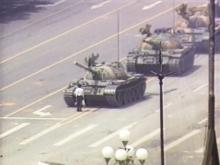
We’re commemorating the 25th Anniversary of the massacre at Tiananmen Square this week. The question is whether anyone remembers. China’s rulers have worked hard for the past 25 years to wipe this memory card clean.
It began when they wiped up the blood on Tiananmen Square, after turning their armed forces against their own people — students and supporters who were seeking more openness and reforms in their system. And this attack on memory has continued relentlessly, to this day. China’s censors are so thorough that even the words “May the 35,” as a veiled reference to those fateful events on June 3-4, 1989, are quickly removed from any appearance on social media.
China’s rulers have good reason to repress these memories. While attention has been focused on what happened in Beijing’s Tiananmen Square, few recognize that the demonstrations and movement for reform, initiated by students in Beijing who considered themselves patriots, spread around the country. Shen Tong, a 20-year old biology student in Beijing at the time and a leader who narrowly evaded police to leave the country after the crackdown, told NPR that eventually as many as 150 million people in cities throughout the country were on the streets.
Louisa Lim’s aptly titled book, The People’s Republic of Amnesia: Tiananmen Revisited, recounts not only the stories of those involved in the brutal crackdown at Tiananmen, but also documents the bloody suppression which took place at Chengdu. Recently, as NPR’s Beijing correspondent, she took the famous picture from this time of “Tank Man” — a lone student standing in front of Chinese tanks — to contemporary university students in Beijing, asking if they could identify the iconic photo. Of 100 students, only 15 knew what it was, and they didn’t wish to discuss it. Their names were withheld out of respect for their anxiety.